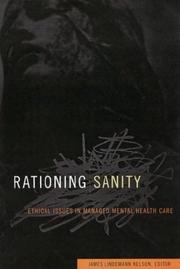| Listing 1 - 10 of 39 | << page >> |
Sort by
|
Periodical
Abstract | Keywords | Export | Availability | Bookmark
 Loading...
Loading...Choose an application
- Reference Manager
- EndNote
- RefWorks (Direct export to RefWorks)

ISBN: 1317826361 0789008157 1315821605 131782637X 9781317826378 0789007800 9780789007803 9780789008152 Year: 2000 Publisher: New York
Abstract | Keywords | Export | Availability | Bookmark
 Loading...
Loading...Choose an application
- Reference Manager
- EndNote
- RefWorks (Direct export to RefWorks)
Develop new ways to provide ethical, effective mental health services in a world of managed care!Psycho-Economics gives psychologists and mental health care administrators suggestions for handling the changes that have come with the advent of managed care. Using empirical research and practitioner accounts, this informative book assesses the impact of managed care, suggests ways to ameliorate its negative effects, and proposes ideas for the improvement of the managed care system and mental health care in general. Psycho-Economics takes a clear look at the ways in which the
Book
Year: 2006 Publisher: Rockville, MD : U.S. Dept. of Health and Human Services, Substance Abuse and Mental Health Services Administration, Center for Mental Health Services,
Abstract | Keywords | Export | Availability | Bookmark
 Loading...
Loading...Choose an application
- Reference Manager
- EndNote
- RefWorks (Direct export to RefWorks)
Book
Year: 1998 Publisher: Cambridge, Mass. National Bureau of Economic Research
Abstract | Keywords | Export | Availability | Bookmark
 Loading...
Loading...Choose an application
- Reference Manager
- EndNote
- RefWorks (Direct export to RefWorks)
Background: Parity in insurance coverage for mental health and substance abuse has been a key goal of mental health and substance abuse care advocates in the United States during most of the past 20 years. The push for parity began during the era of indemnity insurance and fee for service payment when benefit design was the main rationing device in health care. The central economic argument for enacting legislation aimed at regulating the insurance benefit was to address market failure stemming from adverse selection. The case against parity was based on inefficiency related to moral hazard. Empirical analyses provided evidence that ambulatory mental health services were considerably more responsive to the terms of insurance than were ambulatory medical services. Aims: Our goal in this research is to reexamine the economics of parity in the light of recent changes in the delivery of health care in the United States. Specifically managed care has fundamentally altered the way in which health services are rationed. Benefit design is now only one mechanism among many that are used to allocate health care resources and control costs. We examine the implication of these changes for policies aimed at achieving parity in insurance coverage. Method: We develop a theoretical approach to characterizing rationing under managed care. We then analyze the traditional efficiency concerns in insurance, adverse selection and moral hazard in the context of policy aimed at regulating health and mental health benefits under private insurance. Results: We show that since managed care controls and utilization in new ways Parity in benefit design no longer implies equal access to and quality of mental health and substance abuse care. Because costs are controlled by management under managed care and not primarily by out of pocket prices paid by consumers, demand response recedes as an efficiency argument against parity. At the same time parity in benefit design may accomplish less with respect to providing a remedy to problems related to adverse selection.
Managed mental health care --- Substance abuse --- Treatment.
Book
ISBN: 0880486675 Year: 1994 Publisher: Washington, DC American Psychiatric Press
Abstract | Keywords | Export | Availability | Bookmark
 Loading...
Loading...Choose an application
- Reference Manager
- EndNote
- RefWorks (Direct export to RefWorks)

ISBN: 905702537X Year: 1997 Publisher: Amsterdam Harwood Academic Pub.
Abstract | Keywords | Export | Availability | Bookmark
 Loading...
Loading...Choose an application
- Reference Manager
- EndNote
- RefWorks (Direct export to RefWorks)
Book
ISBN: 0080519148 Year: 2004 Publisher: Burlington Elsevier
Abstract | Keywords | Export | Availability | Bookmark
 Loading...
Loading...Choose an application
- Reference Manager
- EndNote
- RefWorks (Direct export to RefWorks)
Therapist's Guide to Clinical Intervention, Second Edition is a must-have reference for clinicians completing insurance forms, participating in managed care, or practicing in treatment settings requiring formalized goals and treatment objectives. This practical, hands-on handbook outlines treatment goals and objectives for each type of psychopathology as defined by the diagnostic and statistical manual by the American Psychiatric Association, identifies skill-building resources, and provides samples of all major professional forms.With over 30% new information, this new edition covers a variety of new special assessments including domestic violence, phobias, eating disorders, adult ADHD, and outpatient progress. New skill-building resources focus on surviving holiday blues, improving communication, overcoming shyness, teaching couples to fight "fair", surviving divorce, successful stepfamilies, managing anger, coping with post traumatic stress, and more. Additional professional forms have been added including treatment plans, a brief mental health evaluation, parent's questionnaire, and a contract for providing service for people with no insurance.
Psychotherapy --- Psychiatric records --- Managed mental health care. --- Managed mental health care

ISBN: 0878401458 Year: 2003 Publisher: Washington (D.C.) Georgetown university press
Abstract | Keywords | Export | Availability | Bookmark
 Loading...
Loading...Choose an application
- Reference Manager
- EndNote
- RefWorks (Direct export to RefWorks)
Mental illness is the poor, and somehow "damaged," cousin to physical ailments in the eyes of too many in our society. Compare the difference in how people would respond to someone who had fallen and broken their leg on the street, to how most react to those mentally ill among us, on those same streets, who spend their winters on steam grates and forage for food in dumpsters. Rationing Sanity is a provocative analysis of the mental health care system in the United States, dealing with issues of justice and access to mental health care.How should a decent society, affluent but facing many serious calls on its resources, best care for citizens afflicted with severe and persistent mental illnesses? James Lindemann Nelson brings together, for the first time, scholars of the ethics of mental health care and top managed care policy analysts to address this crucial problem. Rationing Sanity integrates those perspectives with the thoughtful practice-based experience of physicians well versed in the actual care of people with emotional and behavioral problems. Over a period of years, the contributors met face-to-face to engage each other on the ethics of managed mental health care -- the result is a unique, collaborative effort that provides a wealth of important new insights on not only how Americans can readjust their attitudes toward the mentally ill -- but also how we may find more just and humane treatment for those afflicted.

ISBN: 1134941013 0415763304 0203782453 1134940947 9781134940943 9780203782453 9781134941087 1134941080 9781134941018 9780415763301 1583910026 9781583910023 9780203782453 Year: 2003 Publisher: New York : Brunner-Routledge,
Abstract | Keywords | Export | Availability | Bookmark
 Loading...
Loading...Choose an application
- Reference Manager
- EndNote
- RefWorks (Direct export to RefWorks)
Clinicians who understand mental health care administration in addition to their clinical fields are likely to be valuable to the organizations in which they work. This handbook is an accessible source of information for professionals coming from either clinical or management backgrounds. Sections offer coverage in: mental health administrative principles, mental health care management, business, finance and funding of care, information technology, human resources and legal issues.
Mental health services --- Managed mental health care. --- Administration.
Book
ISBN: 1282687514 9786612687518 1118269691 0470609117 Year: 2010 Publisher: Hoboken, N.J. : Wiley,
Abstract | Keywords | Export | Availability | Bookmark
 Loading...
Loading...Choose an application
- Reference Manager
- EndNote
- RefWorks (Direct export to RefWorks)
Praise for Marketing for the Mental Health Professional: An Innovative Guide for Practitioners ""This book is packed with useful strategies that have worked for years and years in the business world. People who follow the advice here are going to go places.""-Dr. Thomas Phelan, Psychologist and bestselling author of 1-2-3 Magic ""David's book is brilliant! He guides us through our own resistance and the unquestioned beliefs we have held around marketing, money, and our profession. Not only have I received a long-overdue education, David has inspired in me th
Mental health services --- Managed mental health care. --- Marketing.
| Listing 1 - 10 of 39 | << page >> |
Sort by
|

 Search
Search Feedback
Feedback About UniCat
About UniCat  Help
Help News
News